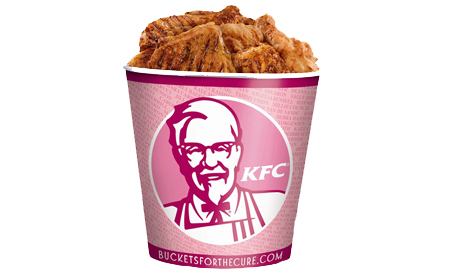Pinkification: how breast cancer awareness got commodified for profit
What began as a social movement serving urgent health needs for women has been hollowed out by cynical marketeering

SE Smith for This Ain't Livin', part of the Guardian Comment Network
theguardian.com, Wednesday 3 October 2012 16.00 EDT
Jump to comments (70)

The Susan G Komen/KFC Buckets for the Cure partnership, which Breast Cancer Action described as 'feeding people carcinogenic grilled chicken that raises the risk of … breast cancer'. Photograph: www.ecouterre.com
The breast cancer awareness industry has become a multibillion dollarjuggernaut spanning multiple continents, flooding them with a sea of pink ribbons and tie-in products intended to entice socially aware consumers. Buy enough pink things, and you, too, will conquer cancer; the next level of awareness is always a step away, and with it will come some magical development in breast cancer research. Breast cancer has become a product, not just a disease.
It's a far cry from the early origins of the movement, when women fought hard to even get people to acknowledge that breast cancer existed, let alone talk about it. Breast cancer was a deeply taboo subject that wasn't fit for polite society, and it needed the ferocious efforts of feminists, and other activists, to catapult it into the public consciousness and fight for research, along with funding for treatment and patient support.
In conversations about the direction the "awareness" movement has taken, it's important to examine its early roots, and the things people did to make society more conscious and force a discussion. The gradual commodification of breast cancer reflected a failure of the movement, in that it wasn't able to adapt quickly enough to fight the commercialisation of breast cancer awareness. Now, groups like Breast Cancer Action are having to fight cancer on two fronts: battling for patients, as well as fighting the rise of pinkification.
The group points out that many of the products tied to breast cancer awareness are themselves linked with cancer, or are produced by firms with a terrible record on environmental pollution and other activities known to contribute to high cancer rates. In the course of trying to make a difference, a monster was created instead.
Activists who fought to take breast cancer mainstream obviously didn't do so with the end goal of pink yoghurt lids in every grocery store. Their goal was to increase funding for research, treatment and support for a disease that went largely undiscussed; one that women were told to be ashamed of, a condition that was so horrifyingly embarrassing that patients had to conceal it by any means possible. They wanted to create a world where cancer rates were lower and patients got the care they needed. They also wanted a world where patients didn't need to hide the fact that they were sick.
They wanted to create a world where the words "breast cancer" weren't stigmata. And the original pink ribbon campaign didn't start as a canny branding move to rake in profits for major corporations, but rather as a symbol of solidarity. Survivors wore the ribbons as open marks of their survival, to identify themselves not just to other survivors, but to society in general. A signal that they were alive, not going anywhere and determined to talk about the disease they'd experienced.
But slowly, the pink ribbon came to mean something else. Rather than being a symbol of survival and strength, it became more generally a symbol of support, and then it was appropriated by firms that wanted to slap pink ribbons on their products for more profits. The Komen campaign realised it had a goldmine on its hands and it startedaggressively protecting the pink ribbon brand. As the organization grew in size and power, it became harder and harder for activists to fight the commodification it promoted and the unhealthy business relationships it had with firms that wanted to exploit the ribbon, along with survivors and activists interested in directly addressing breast cancer.
The path of the pink ribbon, and breast cancer awareness in general, reflects a larger problem experienced by social movements. It seems that every time they develop a tool of solidarity and something to use as they work in a coalition to address a specific social issue, that tool is handily repurposed for profits – and before anyone can move to take it back, it's too late. Social movements in general can be excruciatingly slow to adapt to changing circumstances, just as the breast cancer awareness movement was.
A movement that started with powerful intentions became commercial,gender-essentialist and repugnant in many of its mainstream incarnations, even as smaller campaigns and voices actively agitated against its framing. Those who oppose the use of sexism and gender essentialism in breast cancer campaigns are cast as opponents of action on breast cancer. In a strange twist, the people demanding that major breast cancer awareness campaigners be accountable first and foremost to patients are told they don't care about breast cancer patients.
When patients are saying they don't want to be reduced to their anatomy with cutesy slogans like "save the ta-tas", and that they're enraged by pink ribbon branding of products known to be cancerous, they're told the cause is more important than their feelings. When people at higher risk for breast cancer express concerns about the failure of outreach campaigns to reach them or acknowledge their experiences, we're told we aren't standing in solidarity with the movement and should be silent in the name of the greater good.
The willful obstinacy when it comes to denying the voices of people who want to see the movement return to purer roots is, of course, one part pure capitalism. Big firms have learned that breast cancer is a profit-generation tool, and they aren't willing to give it up. It's also one part insistence on neglecting the diversity of voices in the community. Just as mainstream feminism has failed many people simply by refusing to listen to them, the mainstream breast cancer movement has failed many people by pretending their concerns don't exist.
Adaptation is a tough skill, but it's critical for social movements. It's also not impossible. Look, for example, at the way the black community has shifted organising strategies and priorities in response to changing social circumstances, with flexible leadership and members interested in addressing shifting needs. Contrast that with the white-led mainstream breast cancer awareness movement and its determined ignorance on social issues that affect the people it claims to advocate for.
© 2013 Guardian News and Media Limited or its affiliated companies. All rights reserved.

No comments:
Post a Comment